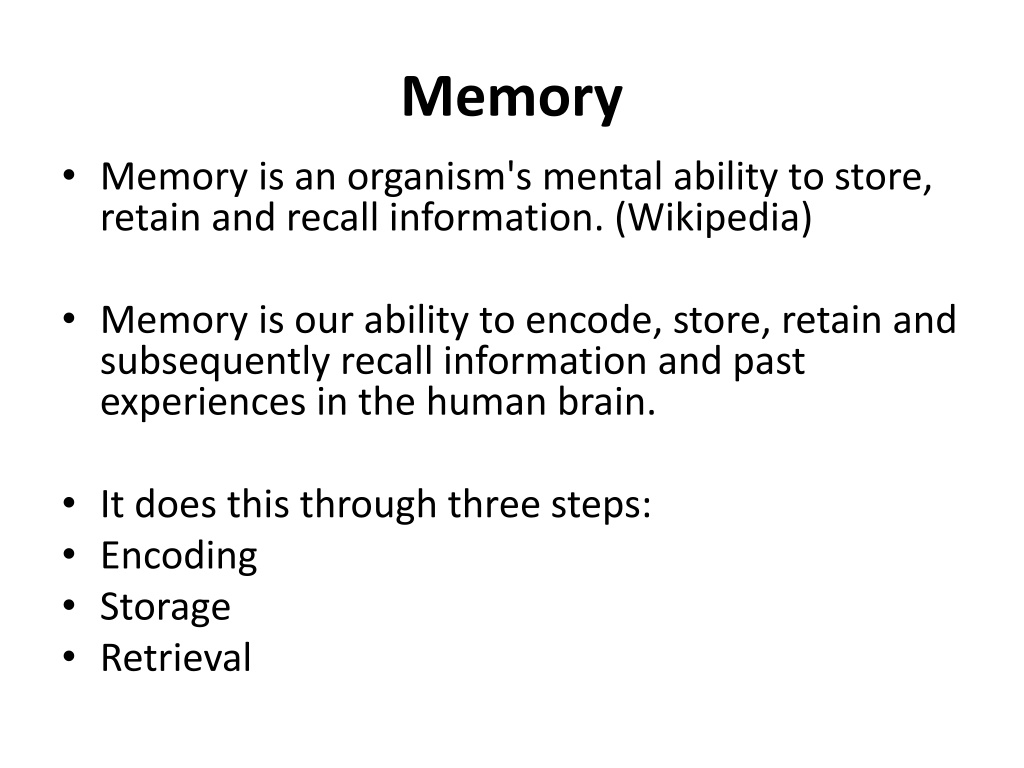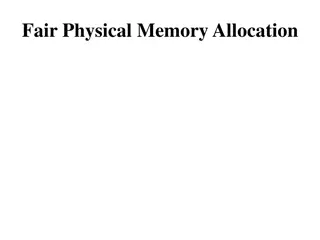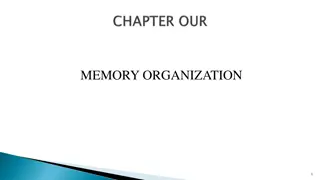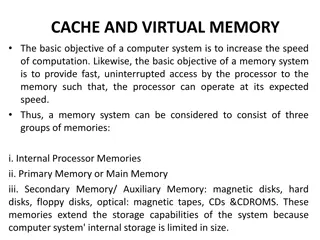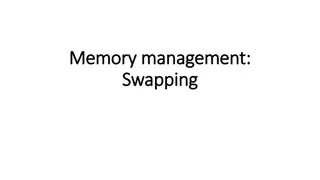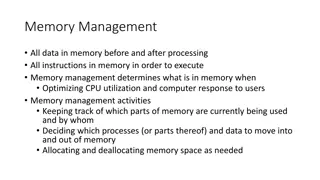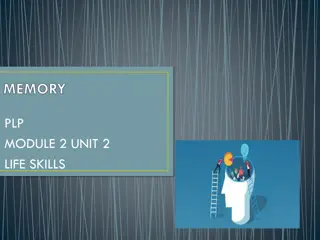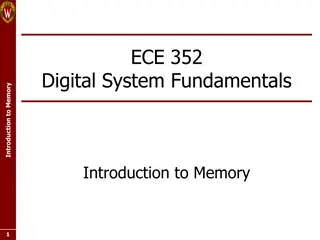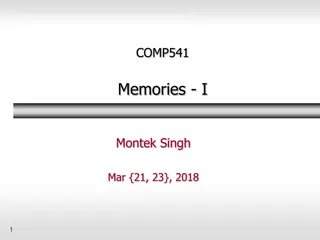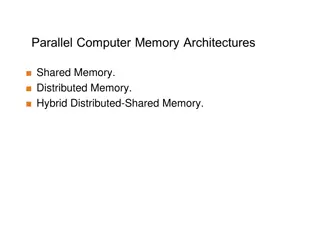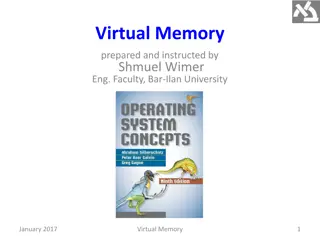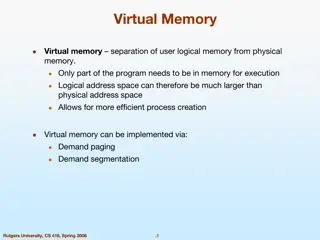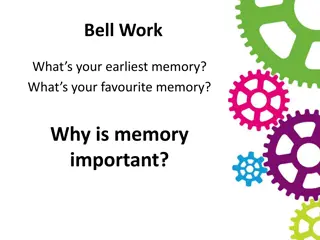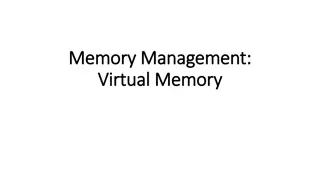Understanding the Basics of Memory Functioning
Memory is the mental ability to store, retain, and recall information through encoding, storage, and retrieval processes. It involves sensory, short-term, and long-term memory stages, with encoding encompassing semantic, acoustic, and visual aspects. The retrieval process involves locating and recovering stored information for conscious use. Various types of memory, including sensory memory storing fleeting mental images, contribute to our overall cognitive functioning.
Download Presentation

Please find below an Image/Link to download the presentation.
The content on the website is provided AS IS for your information and personal use only. It may not be sold, licensed, or shared on other websites without obtaining consent from the author. Download presentation by click this link. If you encounter any issues during the download, it is possible that the publisher has removed the file from their server.
E N D
Presentation Transcript
Memory Memory is an organism's mental ability to store, retain and recall information. (Wikipedia) Memory is our ability to encode, store, retain and subsequently recall information and past experiences in the human brain. It does this through three steps: Encoding Storage Retrieval
Remembering is thought to involve at least three steps. Incoming information is first held for a second or two by sensory memory. Information selected by attention is then transferred to temporary storage in short-term memory. If new information is not rapidly encoded, or rehearsed, it is forgotten. If it is transferred to long-term memory, it becomes relatively permanent, although retrieving it may be a problem. The preceding is a useful model of memory; it may not be literally true of what happens in the brain
Encoding Encoding: the modification of information to fit the preferred format for the memory system. When we are exposed to stimuli and encode information, we do it in three ways: 1. Semantic Encoding encoding of meaning including meaning of words 2. Acoustic Encoding encoding of sound especially sound of words 3. Visual Encoding encoding of picture images
Storage Storage: the retention of encoding material over time. In terms of storing material, we have three stages of memory Sensory Memory Working Memory (short-term memory) Long-term Memory
Retrieval Retrieval: The locating and recovering of information from memory. the calling back of stored information in response to some cue for use in a process or activity. The third process is the retrieval of information that we have stored. We must locate it and return it to our consciousness. Some retrieval attempts may be effortless due to the type of information.
Types of Memory Sensory memory Storing an exact copy of incoming information for a few seconds; the first stage of memory Icon: A fleeting mental image or visual representation Echo: After a sound is heard, a brief continuation of the sound in the auditory system Sensory memories lasts just long enough to dissolve into the next one, giving us the impression of a constant flow.
Working memory/short term memory Working memory is often known as short term memory. It is the place where we sort and encode information before transferring it to long-term memory, or forgetting it. Generally, it holds information for about 20 seconds, far longer than sensory memory. Most research suggest that we can hold seven pieces of information in our working memory, though it varies slightly. We do have coping mechanisms, however: Chunking Rehearsal
Chunking A chunk is any memory pattern or meaningful unit of memory. By creating these chunks, a process called chunking, we can fit more information into the seven available slots of working memory. Example: 0303987123 vs. 0303-987-123
Rehearsal Another memory technique is called maintenance rehearsal. This is a process where information is repeated to keep it from fading while in working memory.
Long term memory Storing information relatively permanently Stored on basis of meaning and importance As far as anyone knows, there is no limit to the duration or capacity of the long term memory. Long term memory is essentially all of your knowledge of yourself and the world around you. Unless an injury or illness occurs, this memory is limitless.
Long Term memory Procedural memory (implicit) is the part of long term memory where we store memories of how things are done. (knowing how) Declarative memory (explicit) is the part of long term memory where we store specific information such as facts and events. (knowing what) More often than procedural memory, declarative memory requires some conscious mental effort.
Declarative memory Declarative memory has two divisions: Episodic Memory: This is the portion of memory that stores personal events or episodes. This is the storage of things like time and place. Semantic Memory: This portion of memory stores general knowledge, facts and language meaning. This is specifically where all the information you know is stored.
Forgetting Forgetting refers to loss of information from long- term memory. Encoding Failure: When a memory was never formed in the first place Memory Traces: Physical changes in nerve cells or brain activity that occur when memories are stored Memory Decay: When memory traces become weaker; fading or weakening of memories; happens frequently for sensory memories and short-term memories Disuse: Theory that long-term memory traces weaken when memories are not used or retrieved often
More on Forgetting Repression: Unconsciously pushing painful, embarrassing or threatening memories out of awareness/consciousness Motivated forgetting, according to some theories Suppression: Consciously putting something painful or threatening out of mind or trying to keep it from entering awareness
Flashbulb Memories Of all our forms of memory, a few are exceptionally clear and vivid. We call these flashbulb memories. These tend to be memories of highly emotional events. Typically people remember exactly where they were when the event happened, what they were doing and the emotions they felt. Ex. 9/11 Includes both positive and negative events
Ways to Improve Memory Knowledge of Results: Feedback allowing you to check your progress Recitation: Summarizing aloud while you are rehearsing material Rehearsal: Reviewing information mentally (silently) Selection: Selecting most important concepts to memorize Organization: Organizing difficult items into chunks; a type of reordering
Ways to Improve Memory Whole Learning: Studying an entire package of information at once, like a poem Part Learning: Studying subparts of a larger body of information (like text chapters). Spaced Practice: Alternating study sessions with brief rest periods Serial Position Effect: Making most errors while remembering the middle of the list.
Memory effects by Massed Practice: Studying for long periods without rest periods Lack of sleep decreases retention; sleep aids consolidation Hunger decreases retention
